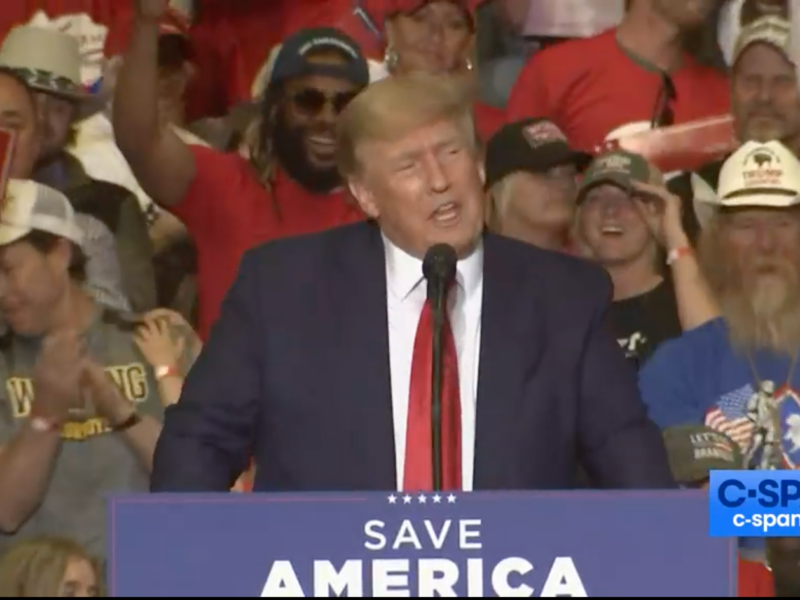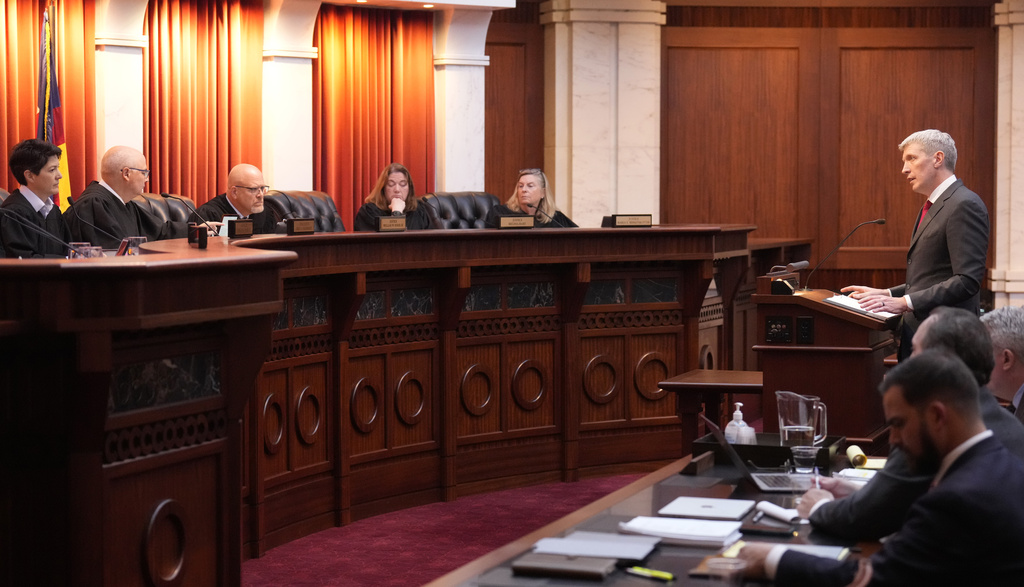Colorado Supreme Court Decision Raises Stakes for Wyoming Man’s Effort to Halt Trump’s Candidacy
Centennial State high court rules former president ineligible for office
- Published In: Politics
- Last Updated: Dec 21, 2023

Former President Donald Trump, seen here campaigning for Harriet Hageman in 2022, was disqualified this week from Colorado's 2024 GOP primary ballot in a bombshell court decision. (Photo via C-SPAN)
By Jacob Gardenswartz
Special to the Wyoming Truth
In a bombshell decision with significant implications for the 2024 election, the Colorado Supreme Court ruled Tuesday that former President Donald Trump is ineligible to serve as president, removing him from the state’s primary ballot via a provision of the U.S. Constitution barring those who “engaged in insurrection” from holding office.
The 4-3 ruling is almost sure to be challenged before the U.S. Supreme Court, with the Colorado justices halting it from taking effect until early next year to give the former president time to appeal. And though Trump’s path to victory in 2024 is unlikely to run through the Centennial State regardless of the ruling — President Joe Biden carried Colorado by over 13 points in 2020 — the decision comes as courts elsewhere are considering whether Trump can seek office once again.
Efforts to disqualify Trump have been attempted or are pending in 28 other states, among them Wyoming, where retired Laramie attorney Tim Newcomb is seeking to block Trump and U.S. Sen. Cynthia Lummis (R-Wyo.) from appearing on the ballot. Newcomb alleges both the U.S. and Wyoming Constitutions bar them from holding office: Trump for his actions on Jan. 6, and Lummis for voting not to certify Biden’s 2020 electoral college victory in Pennsylvania.
In a statement reacting to the Colorado ruling, Trump campaign spokesman Stephen Cheung blasted the “completely flawed decision,” promising to “swiftly file an appeal to the United States Supreme Court.”
Neither Newcomb nor Lummis immediately responded to inquiries about the Colorado decision or its potential impact on the Wyoming case. But other top political figures in the state were quick to decry the court’s findings.
“I am appalled by this outrageous, unAmerican ruling made by radical Leftists on the

Colorado Supreme Court,” Wyoming Secretary of State Chuck Gray told the Wyoming Truth in a statement. “I will continue to fight against this effort in order to protect the integrity of our elections and ensure that the people of Wyoming can choose who to elect for themselves. I urge the U.S. Supreme Court to reverse this outrageous and unprecedented decision.”
“This is a blatant, political attempt to silence American voters,” echoed Sen. John Barrasso (R-Wyo.) in a post on X, the site formerly known as Twitter. “SCOTUS will rightly dispose of it in an ash heap.”
“This is what tyranny looks like,” wrote Rep. Harriet Hageman (R-Wyo), alleging “An activist court has denied Americans the right to vote for the candidate of their choice in Colorado.”
She later shared a link to a fundraising appeal highlighting the Colorado decision, with donations benefiting both Trump’s 2024 campaign and her own reelection fund.
What the Colorado justices ruled
The legal efforts to disqualify Trump center on Section 3 of the 14th Amendment to the U.S. Constitution, a late-19th century addition that declares no person who has “engaged in insurrection or rebellion” after having taken an oath of service can hold any public office. Trump’s efforts on Jan. 6 — documented publicly via video footage, his own tweets and the findings of the congressional panel investigating the attack — constitute such an effort, those pursuing the cases argue.
The divided Colorado decision overturned a lower court ruling in which a Denver judge found that though Trump had “engaged in insurrection,” ambiguity in the constitution’s language about whether the provision applied to the president enabled him to seek office again.
Seeking to push back against that finding, Gray along with two other Republican secretaries of state filed an amicus curiae brief in that case, taking issue with the characterization of Trump as an insurrectionist and suggesting the case be dismissed altogether.
But Colorado’s high court ultimately ruled that the 14th Amendment does cover presidents, and that Trump indeed pursued “a concerted and public use of force… to hinder or prevent the U.S. government from taking the actions necessary to accomplish a peaceful transfer of power.”
“We have little difficulty concluding that substantial evidence in the record supported each of these elements and that, as the district court found, the events of January 6 constituted an insurrection,” the majority wrote.
Recognizing the gravity of the ruling, those removing Trump from the ballot noted that they “do not reach these conclusions lightly.”
“We are mindful of the magnitude and weight of the questions now before us,” they wrote. “We are also cognizant that we travel in uncharted territory, and that this case presents several issues of first impression.”
But the decision was not unanimous. In a dissent, Chief Justice John Boatright argued “an insurrection-related conviction” is required to disqualify a candidate. While Trump faces several civil and criminal charges associated with his efforts to overturn the election, he has yet to be convicted of any such crime.
Justice Carlos Samour went even further, arguing the court’s decision infringed on Trump’s rights to due process.
“Even if we are convinced that a candidate committed horrible acts in the past — dare I say, engaged in insurrection — there must be procedural due process before we can declare that individual disqualified from holding public office,” Samour wrote.
Legal experts across the aisle expect the U.S. Supreme Court to weigh in on the matter in one way or another. And though Trump appointed three of the nine justices now serving, some of the loudest voices in favor of disqualifying Trump have been conservative legal theorists, who argue courts must follow the exact language of the constitution.
What about the Wyoming case?
The effort to disqualify Trump and Lummis in Wyoming relies on the same constitutional provision as the Colorado suit, but there are key differences in the cases that bolster Trump’s chances of remaining on the Wyoming ballot.
While the Colorado case was brought by a group of individuals including registered Republicans and unaffiliated voters eligible to participate in the GOP primary, the case in Wyoming was brought by one man whose party affiliation was not shared publicly. As such, it remains unclear whether Newcomb even has standing to bring the case. Those defending the suit have sought to get it dismissed on such grounds.
And though Newcomb’s suit listed Gray as a sole defendant given his role administering elections in Wyoming, both Trump and the Wyoming Republican Party have sought to join the case.
In a filing this week, Newcomb said he did not oppose such a move and urged the court to “expedite” a hearing on the matter.













